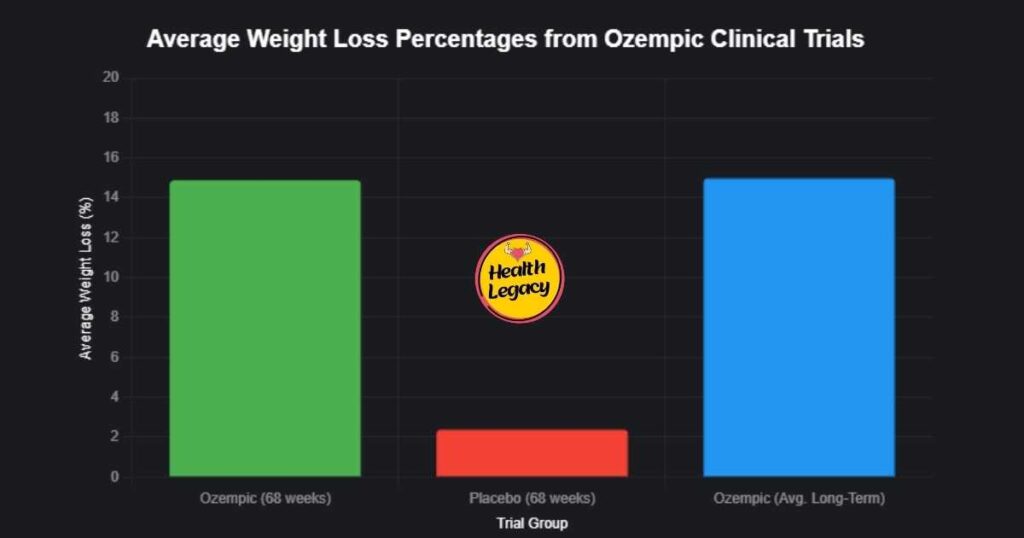Ozempic: The Secret to Effortless Weight Loss?
Ever wonder why your jeans still don’t fit after months of kale smoothies and gym sessions? Tired of hearing about the next big diet that never works? Say hello to Ozempic—a drug that’s got everyone talking, from Hollywood to your neighbor down the street. It’s not just another fad; it’s shaking up weight loss like nothing else. But is it the real deal or just smoke and mirrors? Let’s break it down.
Hey there! We’re the crew at Health Legacy, a bunch of health nuts from places like New York to New Delhi, obsessed with giving you the straight talk on stuff like this. Whether you’re sweating it out in a Mumbai summer or chilling in the Rockies, we’ve got you covered with the facts on Ozempic weight loss, GLP-1 for weight loss, and more. No fluff—just the good stuff.

What’s Ozempic All About?
Ozempic isn’t some trendy new shake or pill. It’s a prescription med that started as a helper for folks with type 2 diabetes. Its secret weapon? A thing called semaglutide, which acts like a hormone your body already makes—GLP-1. This hormone tells your brain you’re full and keeps your blood sugar in check. Pretty neat, right?
Here’s how it works: you take a tiny shot once a week, and boom—your appetite shrinks. You’re not raiding the fridge at midnight anymore. That’s why Ozempic weight loss is blowing up. It’s not just for diabetes anymore—people are using it to drop pounds, and the results are wild.

How Does Ozempic Help You Lose Weight?
So, what’s the magic behind GLP-1 for weight loss? Picture this: you’re at a buffet in Vegas or a street food stall in Delhi, piling your plate sky-high. Normally, you’d keep going until you’re stuffed. But with Ozempic, your brain taps you on the shoulder and says, “You’re good.” That’s appetite suppression at work.
It also slows down how fast food moves through your stomach. You stay full longer, so you’re not snacking every five minutes. Studies say folks can lose 10-15% of their body weight with Ozempic. That’s like dropping 20 pounds if you’re starting at 200. No wonder it’s called a weight loss drug game-changer.
Real People, Real Results: Does It Work?
Let’s meet Angelina Jolie—our fictional 32-year-old teacher who’s been battling the scale forever. She tried yoga, cutting carbs, even those sketchy diet teas. Nothing stuck. Then her doc suggested Ozempic. Three months in, she’s down 18 pounds. “I don’t even crave samosas anymore,” she laughs. (Angelina ’s made up, but her story’s based on real Ozempic reviews.)
Research backs this up. Clinical trials show semaglutide helps with weight management, big time. One study had people losing up to 15% of their weight in about a year. That’s not just a little trim—it’s a whole new you. But it’s not all rosy.

The Catch: Ozempic Side Effects
Every rose has its thorns, and Ozempic’s no different. Sure, it’s a medical breakthrough, but it can hit you where it hurts. Here’s the rundown on Ozempic side effects:
- Nausea: Hits like a wave, especially at first. Some say it’s like morning sickness.
- Vomiting and Diarrhea: Your gut might throw a tantrum.
- Low Energy: Feeling full all the time can sap your zip.
- Big Risks: Pancreatitis or even thyroid issues pop up in rare cases. Scary, right?
Priya felt it too. “The first month was rough—nausea every day,” she says. “But it got better.” Still, side effect concerns mean you’ve got to weigh the pros and cons with your doc.

Who’s Using Ozempic—and Why?
This isn’t just a med for folks with diabetes anymore. People chasing obesity treatment are all over it. Docs prescribe it “off-label” for weight loss, meaning it’s not officially approved for that yet. And then there’s the celebrity influence. Stars like Tracy Morgan have name-dropped Ozempic, making it the talk of Tinseltown.
But it’s not just the rich and famous. Regular folks—like maybe you or your cousin in Chicago—are asking about it. Why? Because losing weight is tough, and Ozempic feels like a shortcut. Still, that buzz comes with questions.

The Big Debate: Is Ozempic Fair Game?
Here’s where it gets messy. Ozempic’s a lifeline for diabetes patients, but its weight loss journey hype has caused shortages. Imagine needing it to stay alive, but it’s sold out because someone’s using it to fit into skinny jeans. That’s the ethical debate people are fired up about.
Some say, “Let everyone have it—it’s their body!” Others argue it should stay for diabetes treatment first. At Health Legacy, we get it—weight struggles are real, but so is fairness. What do you think?
How Much Does Ozempic Cost?
Let’s talk cash. In the U.S., Ozempic runs about $900 a month without insurance. Ouch. In India, it’s cheaper—maybe $200—but still not pocket change. Healthcare costs are a huge hurdle, and insurance doesn’t always cover it for weight loss.
If you’re eyeing this prescription medication, check with your provider. Maybe snag a discount through sites like GoodRx But yeah, it’s a commitment—financially and otherwise.

Ozempic vs. Other Weight Loss Tricks
How does Ozempic stack up? Let’s compare:
- Diet and Exercise: Free and classic, but slow. Ozempic’s faster—if you can handle the shots.
- Surgery: Think gastric bypass. It’s drastic, costly, and permanent. Ozempic’s less intense.
- Other Meds: Wegovy’s another semaglutide option, actually approved for weight loss. Saxenda’s in the mix too.
Curious? Peek at our piece on Weight Loss Medications: What You Need to Know over at Health Legacy.
Is Ozempic a Long-Term Fix?
Here’s the kicker: stop Ozempic, and the weight creeps back. It’s not a cure—it’s a tool. That’s why some call it a metabolic health booster, not a forever fix. Studies show it’s safe for a couple years, but beyond that? We’re still learning.
For Priya, it’s a trade-off. “I’ll keep using it until I hit my goal,” she says. “Then I’ll figure out what’s next.” Smart move—pair it with healthy habits, and you might keep the pounds off.
The Future: Medical Innovation or Flash in the Pan?
Ozempic’s part of a medical innovation wave. New GLP-1 drugs like Mounjaro are popping up, pushing obesity treatment forward. It’s exciting—science is finally tackling weight loss in a big way. But is it sustainable? Time will tell.
At Health Legacy, we’re stoked to watch this unfold. Devanshi Priya, our star writer with a decade of journalism chops, digs into trends like this so you don’t have to. Stick with us for the latest.

FAQs About Ozempic for Weight Loss
1. Can I use Ozempic without diabetes?
Yep, lots of folks do—off-label for weight loss. But it’s not officially approved for that, so insurance might say no. Talk to your doc.
2. How safe is Ozempic long-term?
For diabetes treatment, it’s solid. For weight management, we’ve got data up to two years. Beyond that, it’s a question mark. Stay cautious.
3. What’s the deal with side effects?
Nausea, vomiting, and gut issues are common. Rare stuff like pancreatitis is possible too. Check those side effect concerns with a pro.
4. Are there cheaper alternatives?
Wegovy’s similar but pricier. Lifestyle changes cost nada. Dig into clinical trials—new options might drop soon.
5. Why’s it so popular?
Blame the celebrity influence and real results. People love a quick win for their weight loss journey.

Wrapping It Up: Your Call on Ozempic
So, Ozempic weight loss—miracle or mess? It’s a powerhouse for shedding pounds, no doubt. Studies prove it, and stories like Priya’s back it up. But those Ozempic side effects and healthcare costs? They’re real hurdles. Plus, the ethical debate makes you think twice.
We’re not here to push you either way. At Health Legacy (https://health.winimedia.com), we just want you armed with the facts—whether you’re in Atlanta or Ahmedabad. Chat with your doc, weigh your options, and own your weight loss journey. It’s your health, your rules. What’s your next step?
Disclaimer
The information provided in this article on Health Legacy (https://health.winimedia.com) is for educational and informational purposes only and is not intended as medical advice. While we strive to provide accurate and up-to-date information, Health Legacy makes no representations or warranties of any kind, express or implied, about the completeness, accuracy, reliability, suitability, or availability with respect to the information contained in this article for any purpose.
Ozempic (semaglutide) is a prescription medication primarily used for the treatment of type 2 diabetes and, in some cases, for weight management under medical supervision. The use of Ozempic for weight loss should only be considered under the guidance of a qualified healthcare professional. Individual results may vary, and not everyone will experience the same outcomes.
We acknowledge that there are mixed reviews and discussions about Ozempic on platforms like X (formerly Twitter), including reports of side effects and varying experiences. Common side effects of Ozempic may include nausea, vomiting, diarrhea, and constipation. More serious risks, though rare, can include pancreatitis and thyroid tumors. It is crucial to discuss these potential risks and any concerns with your healthcare provider before starting Ozempic or any other medication.
Health Legacy does not endorse or recommend the use of Ozempic or any other medication without professional medical advice. Always consult with a healthcare professional before starting any new treatment or making changes to your health regimen. The experiences and opinions shared in this article, including those of fictional characters, are not a substitute for professional medical advice, diagnosis, or treatment.
By reading this article, you agree that Health Legacy and its authors are not liable for any direct, indirect, incidental, consequential, or punitive damages arising from your use of the information provided.
Also Read :
How the Pioneer Woman Diet Plan Changed Ree Drummond’s Life
Top 5 Best home workout routines for beginners, home fitness for newbies.
Transform Your Gut Health with These 7 Probiotic Diet Hacks!
Transform Your Life in 5 Simple Steps: The Ultimate Daily Wellness Routine
Top 10 Best Holistic Health Practices for Well-Being
Best Exercise For Weight Loss and Get Fit
External Sources used to write this article




